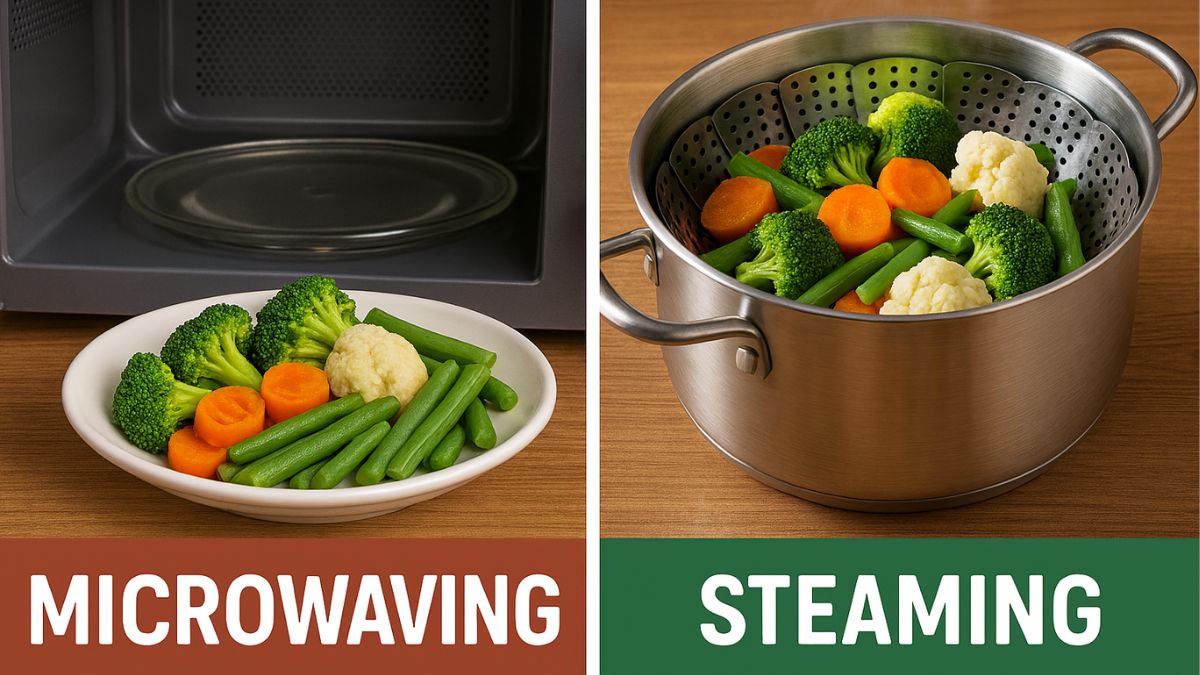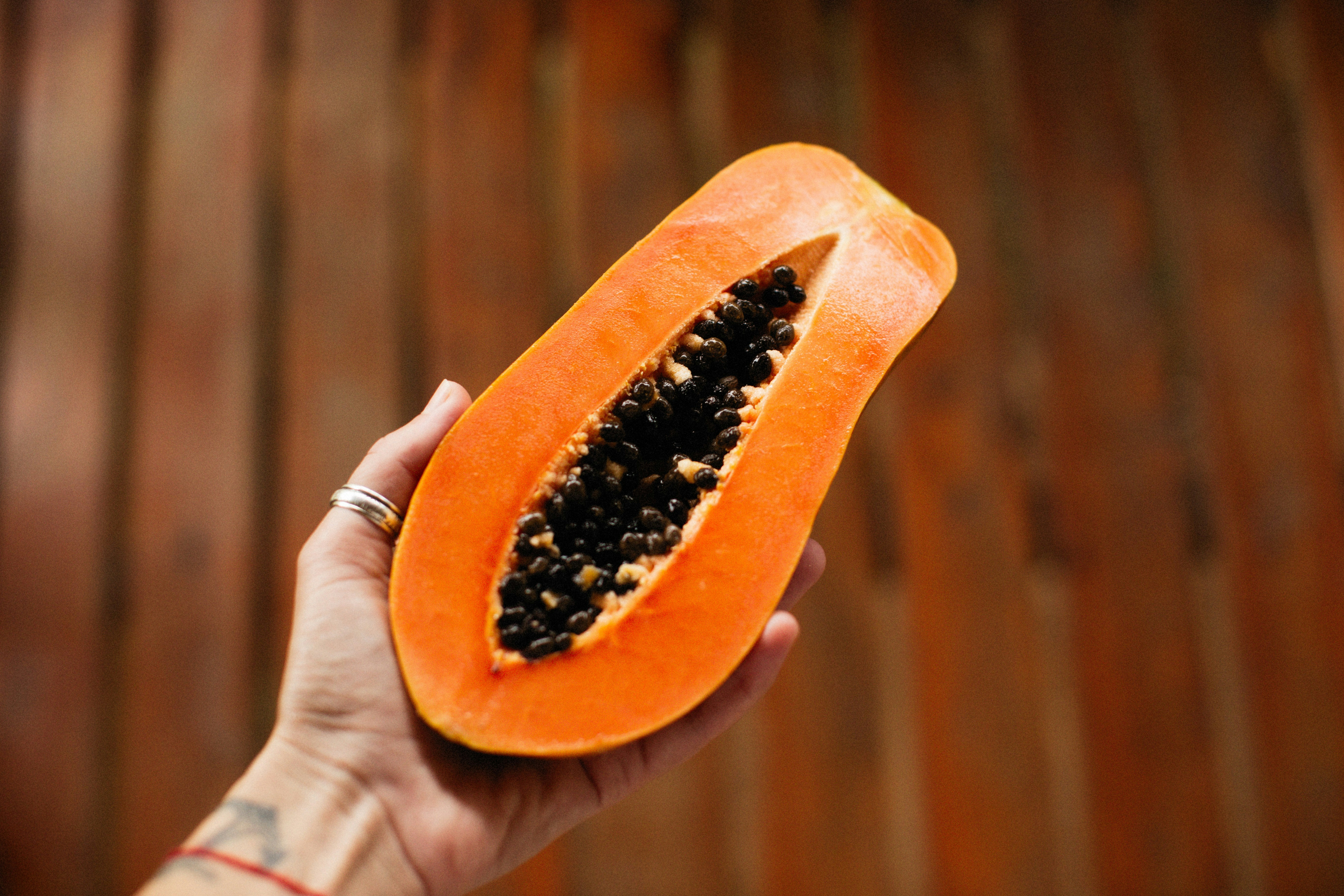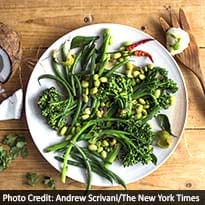Time was, when you talked about Britain's global reach, you were referring to colonies, not cuisine. Though the empire ranged far and wide, you would never know it from the chip butties (a French fry sandwich) and mushy peas on plates back home; we Americans took particular joy in poking fun at that.Then, in the 1990s, the food revolution spearheaded by the likes of Delia Smith, Jamie Oliver, Nigella Lawson and Nigel Slater changed the way the British cooked. Suddenly, we were all of a seasonally driven, artisanal, farm-to-table piece. Now, two new cookbooks - Yotam Ottolenghi's "Plenty More" (to be released by Ten Speed Press next month) and Diana Henry's "A Change of Appetite" (Mitchell Beazley) - indicate that British cooks may have surpassed us with their inventive flavor combinations and adoption of international ingredients.
Ottolenghi and Henry have mastered the art of combining familiar and global flavors in ways that take us just past our collective culinary comfort level without inflicting anything too bizarre. Scented with rose petals and fresh curry leaf, and spiced with red chilies and black mustard seed, their dishes are thoughtful, vibrant, inventive and instructive. I learned something from every recipe I tested, playing with ingredients that were new to me (pandan leaf and pot barley), mixing flavors I would have never thought to combine (beets and rhubarb) and discovering techniques (whacking whole cucumbers with a rolling pin to break them apart before massaging them with salt and spices).With Ottolenghi, none of this should come as a surprise. He already tantalized Americans with his best-selling books "Jerusalem" (written with Sami Tamimi) and "Plenty." In those volumes, Ottolenghi drew a cult following for his effusive cooking style, which embraced and reinterpreted Middle Eastern and Mediterranean flavors.
"Plenty More" is farther flung. It gathers all of his previous influences and widens its grasp to include the Caribbean, India, Japan and Thailand, sometimes all at once, with generally excellent results. Humble scrambled eggs are livened with chilies, cardamom, caraway, cumin and tomatoes; while not reflecting any one culinary tradition, the dish is aromatic, comforting and mouth-searing at the same time.So, too, is the bracing salad of sprouting broccoli, edamame and coconut, spiced with curry leaves, black mustard and lime, which, once I got over my hard-won struggle with a fresh coconut (ouch, watch your thumbs while wielding the hammer), I was able to fully enjoy. I liked the leftovers, sprinkled with a little fish sauce for extra punch, even better.
The only real miss was with the rather fussy tamarind and spice-stuffed potato cakes, which fell apart and stuck to the pan. But it made for a very tasty mess that I renamed tamarind potato hash and happily served to my family.The elaborate chefiness that characterize several of the recipes in "Plenty More" is entirely absent from Henry's book of down-to-earth recipes. Although not well known in the United States, Henry is a celebrated food writer in Britain, with a column in The Sunday Telegraph Stella Magazine and six well-received cookbooks.Her latest book documents the change of appetite that occurred when she started seeking out a more healthful, vegetable-based diet. Unlike Ottolenghi's strictly vegetarian (but not vegan) book, Henry offers recipes for meat. But she keeps the portions small and focuses on fish, seasonal produce, whole grains and plenty of legumes, all seasoned with the likes of togarashi pepper, harissa, dried limes and borage flowers.The thing about Henry's recipes is that if you didn't know they were supposed to be good for you, it would never cross your mind. In every one I tried, the flavors sparkled, the colors on the plate glowed, the dishes truly satisfied. As she writes in the introduction, for her, eating well isn't so much about weight loss. It's about celebrating the foods she loves: fresh, whole, unprocessed foods in season. Her recipes are in no way abstemious. There is a gorgeous butterflied leg of lamb with a Persian mint syrup, chile and garlic crab, and fragrant lentils with roasted tomatoes and a runny-centered egg. Desserts include an irresistibly moist almond cake made with spelt flour and juicy cherries.It is fresh, well seasoned and highly unusual cooking we have not often seen on Yankee soil. Until, thanks to Henry and Ottolenghi, now.Sprouting Broccoli and Edamame Salad With Curry Leaves and Coconut
Time: 30 minutes
Yield: 4 servings
Salt
14 ounces (2 bunches) purple sprouting broccoli or broccolini, trimmed
1/2 pound haricots verts, trimmed
7 ounces (about 1/2 cup) shelled, frozen edamame
4 tablespoons olive oil
1 medium yellow onion, finely diced
2 1/2 teaspoons black mustard seeds
30 fresh curry leaves, or 40 dried curry leaves
3 whole dried chilies (or fewer, to taste)
Zest of 1 lime, plus 1 1/2 tablespoons lime juice, more to taste
2/3 cup cilantro leaves
2/3 cup fresh coarsely grated coconut (optional)1. Bring a large pot of salted water to boil. Add broccoli (you should have about 6 cups) and haricots verts and blanch 3 to 4 minutes, until just tender but still with a bite. Use slotted spoon to transfer vegetables to colander and run under cold water. Pat dry, transfer to large bowl and set aside.
2. Return pot of water to a boil and add edamame. Blanch for 2 minutes. Transfer to colander, run under colder water, pat dry and add to vegetables. Sprinkle 1/2 teaspoon salt over vegetables, stir and set aside.
3. Heat 3 tablespoons olive oil in sauté pan over medium-high heat. Add onion and 1/4 teaspoon salt; cook for 4 minutes until soft. Add black mustard seeds, and when seeds begin to pop, add curry leaves, chilies and lime zest. Sauté for 2 minutes before pouring mixture over vegetables. Stir and let sit 10 minutes.
4. Just before serving, add lime juice, cilantro and coconut, and drizzle with remaining olive oil. Gently stir and serve.
(Adapted from "Plenty More," by Yotam Ottolenghi)Roasted Tomatoes and Lentils With Dukkah-Crumbled Eggs
Time: 1 hour
Yield: 6 servingsFOR THE DUKKAH:
1/2 cup hazelnuts (skins on)
1/3 cup sesame seeds
1 teaspoon nigella seeds
1 tablespoon sunflower seeds
3 tablespoons coriander seeds
1 tablespoon white peppercorns
1 1/2 tablespoons cumin seeds
1 teaspoon ground paprika
1/2 tablespoon sea salt flakesFOR THE TOMATOES AND EGGS:
12 large plum tomatoes, halved
3 tablespoons olive oil
2 teaspoons store-bought harissa
1/2 tablespoon sugar
Salt and black pepper, to taste
6 extra-large eggsFOR THE LENTILS:
1 tablespoon olive oil
1/2 yellow onion, finely chopped
1 celery stalk, finely chopped
1 garlic clove, finely chopped
1 1/3 cups Puy or green lentils
1 sprig of thyme
1 bay leaf
Juice of 1/2 lemon
1 tablespoon sherry vinegar
1/4 cup extra-virgin olive oil
2 tablespoons chopped cilantro leaves1. To make dukkah, put hazelnuts in a dry skillet and toast over high heat until nuts smell roasted. Do not go too far, as they burn easily. Transfer to a plate to cool slightly, then crush in a mortar to a coarsely ground mixture. Put sesame and nigella seeds in dry skillet and toast until golden brown. Follow with sunflower seeds. Coarsely crush all toasted seeds and add to nuts. Toast coriander seeds until fragrant and coarsely grind. Repeat with peppercorns and cumin seeds. Combine nuts, seeds and toasted spices with the paprika and sea salt. Store in airtight container until needed. Alternatively, place all toasted spices and seeds together in a food processor and pulse until finely ground. Add nuts at end and pulse until they are coarsely ground.
2. For tomatoes, heat oven to 375 degrees. Lay halved tomatoes on single layer in roasting pan. Mix olive oil and harissa together and toss with tomatoes to coat, ending cut-side up; sprinkle with sugar and season with salt and pepper. Roast for 45 minutes to 1 hour, or until caramelized in parts and slightly shrunken.
3. Meanwhile, cook lentils. Heat oil in saucepan and gently sauté onion, celery and garlic until soft but not browned. Add lentils and stir. Add thyme and bay leaf. Pour in 3 cups of water, bring to a boil, reduce heat and simmer, uncovered, until lentils are just tender, about 15 to 25 minutes. When cooked, lentils should absorb all liquid (drain any excess liquid if they haven't, or add a little more water if they dry out while cooking). Remove thyme and bay leaf. Add lemon juice, vinegar, olive oil and cilantro. Taste for seasoning.
4. Cook the eggs in boiling water for 6 minutes. They should still be a little runny in the middle. Rinse in cold water and once cool enough to handle, quickly peel. Roll lightly in dukkah and set each on top of a serving of lentils and tomatoes. Break the egg in half to see yolk (optional) and sprinkle more dukkah on top. Serve immediately.
(Adapted from "A Change of Appetite," by Diana Henry)© 2014 New York Times News Service
Ottolenghi and Henry have mastered the art of combining familiar and global flavors in ways that take us just past our collective culinary comfort level without inflicting anything too bizarre. Scented with rose petals and fresh curry leaf, and spiced with red chilies and black mustard seed, their dishes are thoughtful, vibrant, inventive and instructive. I learned something from every recipe I tested, playing with ingredients that were new to me (pandan leaf and pot barley), mixing flavors I would have never thought to combine (beets and rhubarb) and discovering techniques (whacking whole cucumbers with a rolling pin to break them apart before massaging them with salt and spices).With Ottolenghi, none of this should come as a surprise. He already tantalized Americans with his best-selling books "Jerusalem" (written with Sami Tamimi) and "Plenty." In those volumes, Ottolenghi drew a cult following for his effusive cooking style, which embraced and reinterpreted Middle Eastern and Mediterranean flavors.
"Plenty More" is farther flung. It gathers all of his previous influences and widens its grasp to include the Caribbean, India, Japan and Thailand, sometimes all at once, with generally excellent results. Humble scrambled eggs are livened with chilies, cardamom, caraway, cumin and tomatoes; while not reflecting any one culinary tradition, the dish is aromatic, comforting and mouth-searing at the same time.So, too, is the bracing salad of sprouting broccoli, edamame and coconut, spiced with curry leaves, black mustard and lime, which, once I got over my hard-won struggle with a fresh coconut (ouch, watch your thumbs while wielding the hammer), I was able to fully enjoy. I liked the leftovers, sprinkled with a little fish sauce for extra punch, even better.
The only real miss was with the rather fussy tamarind and spice-stuffed potato cakes, which fell apart and stuck to the pan. But it made for a very tasty mess that I renamed tamarind potato hash and happily served to my family.The elaborate chefiness that characterize several of the recipes in "Plenty More" is entirely absent from Henry's book of down-to-earth recipes. Although not well known in the United States, Henry is a celebrated food writer in Britain, with a column in The Sunday Telegraph Stella Magazine and six well-received cookbooks.Her latest book documents the change of appetite that occurred when she started seeking out a more healthful, vegetable-based diet. Unlike Ottolenghi's strictly vegetarian (but not vegan) book, Henry offers recipes for meat. But she keeps the portions small and focuses on fish, seasonal produce, whole grains and plenty of legumes, all seasoned with the likes of togarashi pepper, harissa, dried limes and borage flowers.The thing about Henry's recipes is that if you didn't know they were supposed to be good for you, it would never cross your mind. In every one I tried, the flavors sparkled, the colors on the plate glowed, the dishes truly satisfied. As she writes in the introduction, for her, eating well isn't so much about weight loss. It's about celebrating the foods she loves: fresh, whole, unprocessed foods in season. Her recipes are in no way abstemious. There is a gorgeous butterflied leg of lamb with a Persian mint syrup, chile and garlic crab, and fragrant lentils with roasted tomatoes and a runny-centered egg. Desserts include an irresistibly moist almond cake made with spelt flour and juicy cherries.It is fresh, well seasoned and highly unusual cooking we have not often seen on Yankee soil. Until, thanks to Henry and Ottolenghi, now.Sprouting Broccoli and Edamame Salad With Curry Leaves and Coconut
Time: 30 minutes
Yield: 4 servings
Salt
14 ounces (2 bunches) purple sprouting broccoli or broccolini, trimmed
1/2 pound haricots verts, trimmed
7 ounces (about 1/2 cup) shelled, frozen edamame
4 tablespoons olive oil
1 medium yellow onion, finely diced
2 1/2 teaspoons black mustard seeds
30 fresh curry leaves, or 40 dried curry leaves
3 whole dried chilies (or fewer, to taste)
Zest of 1 lime, plus 1 1/2 tablespoons lime juice, more to taste
2/3 cup cilantro leaves
2/3 cup fresh coarsely grated coconut (optional)1. Bring a large pot of salted water to boil. Add broccoli (you should have about 6 cups) and haricots verts and blanch 3 to 4 minutes, until just tender but still with a bite. Use slotted spoon to transfer vegetables to colander and run under cold water. Pat dry, transfer to large bowl and set aside.
2. Return pot of water to a boil and add edamame. Blanch for 2 minutes. Transfer to colander, run under colder water, pat dry and add to vegetables. Sprinkle 1/2 teaspoon salt over vegetables, stir and set aside.
3. Heat 3 tablespoons olive oil in sauté pan over medium-high heat. Add onion and 1/4 teaspoon salt; cook for 4 minutes until soft. Add black mustard seeds, and when seeds begin to pop, add curry leaves, chilies and lime zest. Sauté for 2 minutes before pouring mixture over vegetables. Stir and let sit 10 minutes.
4. Just before serving, add lime juice, cilantro and coconut, and drizzle with remaining olive oil. Gently stir and serve.
(Adapted from "Plenty More," by Yotam Ottolenghi)Roasted Tomatoes and Lentils With Dukkah-Crumbled Eggs
Time: 1 hour
Yield: 6 servingsFOR THE DUKKAH:
1/2 cup hazelnuts (skins on)
1/3 cup sesame seeds
1 teaspoon nigella seeds
1 tablespoon sunflower seeds
3 tablespoons coriander seeds
1 tablespoon white peppercorns
1 1/2 tablespoons cumin seeds
1 teaspoon ground paprika
1/2 tablespoon sea salt flakesFOR THE TOMATOES AND EGGS:
12 large plum tomatoes, halved
3 tablespoons olive oil
2 teaspoons store-bought harissa
1/2 tablespoon sugar
Salt and black pepper, to taste
6 extra-large eggsFOR THE LENTILS:
1 tablespoon olive oil
1/2 yellow onion, finely chopped
1 celery stalk, finely chopped
1 garlic clove, finely chopped
1 1/3 cups Puy or green lentils
1 sprig of thyme
1 bay leaf
Juice of 1/2 lemon
1 tablespoon sherry vinegar
1/4 cup extra-virgin olive oil
2 tablespoons chopped cilantro leaves1. To make dukkah, put hazelnuts in a dry skillet and toast over high heat until nuts smell roasted. Do not go too far, as they burn easily. Transfer to a plate to cool slightly, then crush in a mortar to a coarsely ground mixture. Put sesame and nigella seeds in dry skillet and toast until golden brown. Follow with sunflower seeds. Coarsely crush all toasted seeds and add to nuts. Toast coriander seeds until fragrant and coarsely grind. Repeat with peppercorns and cumin seeds. Combine nuts, seeds and toasted spices with the paprika and sea salt. Store in airtight container until needed. Alternatively, place all toasted spices and seeds together in a food processor and pulse until finely ground. Add nuts at end and pulse until they are coarsely ground.
2. For tomatoes, heat oven to 375 degrees. Lay halved tomatoes on single layer in roasting pan. Mix olive oil and harissa together and toss with tomatoes to coat, ending cut-side up; sprinkle with sugar and season with salt and pepper. Roast for 45 minutes to 1 hour, or until caramelized in parts and slightly shrunken.
3. Meanwhile, cook lentils. Heat oil in saucepan and gently sauté onion, celery and garlic until soft but not browned. Add lentils and stir. Add thyme and bay leaf. Pour in 3 cups of water, bring to a boil, reduce heat and simmer, uncovered, until lentils are just tender, about 15 to 25 minutes. When cooked, lentils should absorb all liquid (drain any excess liquid if they haven't, or add a little more water if they dry out while cooking). Remove thyme and bay leaf. Add lemon juice, vinegar, olive oil and cilantro. Taste for seasoning.
4. Cook the eggs in boiling water for 6 minutes. They should still be a little runny in the middle. Rinse in cold water and once cool enough to handle, quickly peel. Roll lightly in dukkah and set each on top of a serving of lentils and tomatoes. Break the egg in half to see yolk (optional) and sprinkle more dukkah on top. Serve immediately.
(Adapted from "A Change of Appetite," by Diana Henry)© 2014 New York Times News Service
Advertisement











